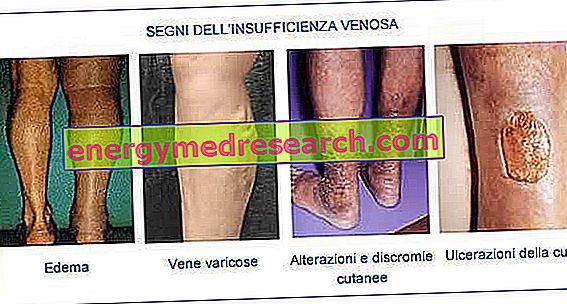Venous insufficiency is a disturbance of the circulation due to a difficult return of venous blood to the heart. Rather frequent condition, venous insufficiency can be caused by pathological alterations of the veins (eg stasis dermatitis, deep vein thrombosis, varicose veins) or by a functional overload of the same (eg lymphedema, postural alterations). Patients suffering from venous insufficiency complain of swelling and tension in the lower limbs, accompanied by generalized hypoxia, calf cramps, tingling in the legs, thickening / hyperpigmentation of the skin and skin ulcers.

What to do
- Practice physical exercise and regular sport: the movement of the limbs promotes blood circulation. Prefer sports that do not require jerks or sudden movements such as tennis or jogging, but prefer sports such as swimming or aiming for long, brisk walks
- Maintain your ideal weight: obese patients are more at risk of venous insufficiency
- Remember to move your legs often: subjects who, for work reasons, are forced to stay in the same position for a long time should move their legs from time to time and stand up on their calves, to promote blood circulation
- Wear elastic stockings / graduated compression bandages: useful remedy to counteract blood stagnation in capillaries, a distinctive sign of venous insufficiency
- Raise the bed in the area near the feet
- Follow relaxation and yoga courses: breathing control seems to be a good remedy to relieve leg discomfort created by venous insufficiency
What NOT to do
- Wear high-heeled shoes often: flat shoes force the leg muscles to work harder, preserving the integrity of the veins
- Wear clothes that are too tight, such as trousers, tight underwear, belts and tights: this type of clothing hinders the circulation of blood
- Remain seated or standing for long periods: the change of position encourages blood flow
- Sit with crossed legs: some doctors believe that this position can somehow aggravate the venous insufficiency
- Those at risk of venous insufficiency should avoid taking the contraceptive pill
- Smoking: smoking increases the risk of venous insufficiency, especially in predisposed subjects
- Expose yourself for long periods in the sun or take very hot baths
What to eat
- Follow a healthy and balanced diet; if necessary, follow a hypocaloric diet.
- Consume foods rich in vitamin C and dark purple / blue
What NOT to Eat
- Fried foods, hyperlipidic: weight control is essential to manage venous insufficiency
- Avoid excess alcohol and coffee
Natural Cures and Remedies
- The herbal remedies are particularly indicated in case of venous insufficiency, to be used also as a completion of the pharmacological treatment. Preferred natural extracts with a capillarotropic-protective action:
- Centella asiatica ( Centella asiatica L.) → phlebotonic properties, stimulating microcirculation
- Horse Chestnut ( Aesculus hippocastanum ) → capillarotropic / protective, anti-inflammatory properties. The active ingredients increase capillary resistance, reduce permeability and favor lymphatic drainage.
- Butcher's broom ( Ruscus aculeatus ) → anti-inflammatory, anti-edema, vaso-protective properties
- Red vine ( Vitis vinifera ) → phlebotonic, capillar-protective, antioxidant, anti-inflammatory properties
- Bilberry ( Vaccinium myrtillus ) → protective property of the vasal endothelium, antioxidant
Pharmacological care
- Anticoagulant drugs with topical action: promote circulation in the context of venous insufficiency:
- Heparan sulfate (eg Clarema, Hemovasal), topical application
- Profibrinolytic drugs: these active substances dissolve the accumulations of fibrin, collected in the varicose veins:
- Streptokinase (eg Streptase)
- Phlebotonic drugs:
- Diosmin (eg Daflon, Diosven)
- Oxerutina (eg Venoruton)
- Injectable sclerosing substances: pharmacological remedy widely used for medium caliber vessels. The injection of the drug causes an inflammatory reaction and a fibrosis of the venous wall: by doing so, it is possible to significantly improve the blood circulation, given that the blood is diverted into healthy veins.
- Sodium tetradecyl sulfate (eg Fibro Vein)
- Ethanolamine oleate (eg Ethamolin)
Watch the video
X Watch the video on youtubePrevention
- Elevate the legs above the level of the heart: from lying down in a supine position, rest your legs on 3-4 pillows. By doing so, it is possible to prevent venous insufficiency by encouraging blood flow
- Not smoking
- Avoid staying upright for a long time
- Avoid excessively hot environments: high temperatures favor vasodilation
- Wear graduated compression stockings and keep your legs raised: this "double treatment" helps prevent and manage varicose veins in the context of venous insufficiency
- Maintain a healthy weight and stay active
Medical treatments
- Venous insufficiency associated with severe skin ulceration and pathological thickening of the skin must be treated with specific medical treatments:
- valvuloplasty
- Removal of the diseased venous portion
- Radiofrequency ablation
- Laser Therapy



